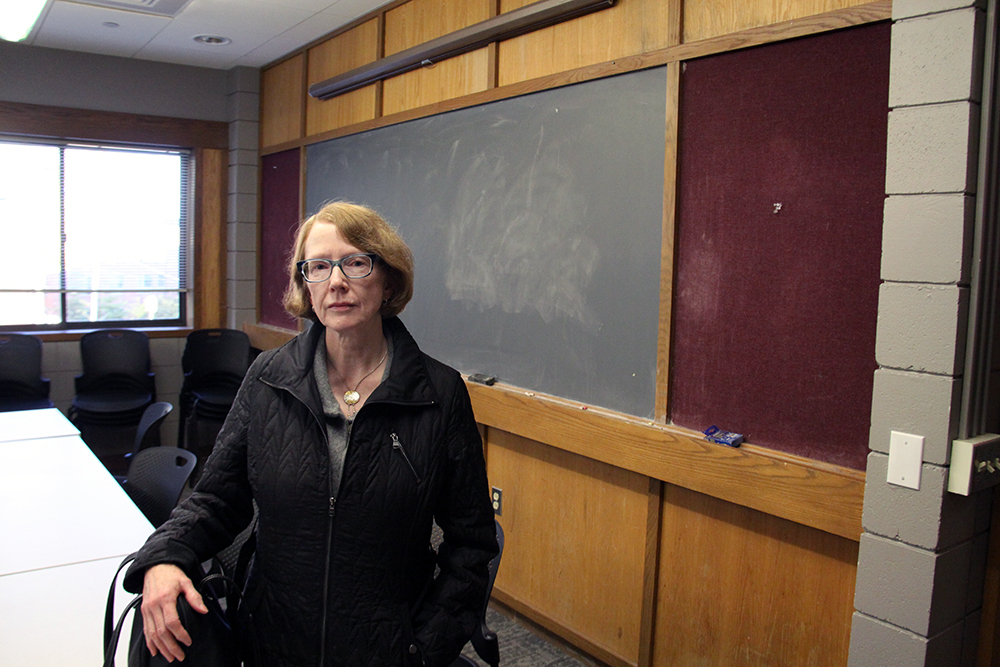
Tufts University professor Carol Wilkinson (Kirk Carapezza/WGBH).
If you're in college, or you've recently graduated, chances are you've been taught by adjunct, part-time professors.
That's because today adjuncts make up more than 50 percent of all college instructors in America — and many of them earn just a few thousand dollars per class.
Now, there's a growing movement to unionize these instructors.
Inside the student center at Tufts University in Medford, writing professor Carol Wilkinson prepares her lecture notes and grades student papers.
For nearly three decades, she's been teaching part-time in the english Department here.
"Tufts treats its part-time faculty significantly better than most colleges do," she said. "Many of us get healthcare, and many of us get a retirement plan working here. I think it's safe to say not many of us make a living wage.”
Wilkinson won't tell us how much she makes, but adjunct professors here earn at least $5,100 per course. That's well above the national average. Still, to make a living, many part-time professors at Tufts teach at more than one school.
"I did that for years and it's exhausting," Wilkinson said.
That's part of the reason why Wilkinson and other adjunct faculty voted last month to collectively negotiate their pay and benefits.
“When we look at income inequality, these people are at the forefront of this problem in this country,” said Malini Cadambi Daniel, campaign director for the Service Employees International Union. She says many of the union's part-time faculty members live in virtual poverty, depending on federal and state assistance to get by.
"Administrators have been able to use adjunct faculty to have a cheaper labor source with no sacrifice in quality," she said. "Well, it's time now for adjunct faculty to say, ‘If we're doing a similar job, then we should be compensated accordingly. We should have security.'”

Labor historian James Green (Kirk Carapezza/WGBH).
The movement is gaining traction. The SEIU says adjunct faculty at Bentley University and Northeastern University are preparing to make that argument next semester. While it’s unusual for part-time workers to form a broad union, there is precedent, says labor historian James Green.
"In the restaurant industry, waiters and waitresses were very strongly unionized at turn of the century," Green said.
Then, there was also a movement to unionize agricultural workers and domestic service workers. While attempts have been made to do this before, Green says it's very difficult.
"Because the work is mobile and because they don't have a lot of money to pay dues,” he said.
But money is also the issue at higher education institutions facing a backlash over high tuition and fees.
"We need to think about our priorities," said Adrianna Kezar, a professor of education at the University of Southern California. "How can we redirect funding to the core mission of the institution, which is instruction?"
Kezar says higher education's dependence on adjuncts is all about keeping costs down. But that doesn't come without consequences.
"It's impacting both student outcomes, like graduation, retention, transfer from two-year to four-year institutions and institutions that don't have faculty to do curriculum development," she said.

Lesley University professor Matt White. (Kirk Carapezza/WGBH).
At Lesley University, part-time professor Matt White and other adjunct instructors here would love to be compensated for classes canceled or under-enrolled.
“We want a legitimate acknowledgement from the university that, hey, here’s the contract," he said. "Even if we’re part-time, here’s what you’re teaching. Here’s the pay. And if it goes under-enrolled it’s not our problem.”
Last month, faculty at Lesley announced plans to unionize. They want to galvanize greater support before calling a vote.
Administrators at Lesley say the university values its adjunct faculty and, if necessary, they're prepared to work with the National Labor Relations Board.
At Tufts, collective bargaining hasn’t begun yet, so administrators won't predict the impact unionization could have on tuition costs.










